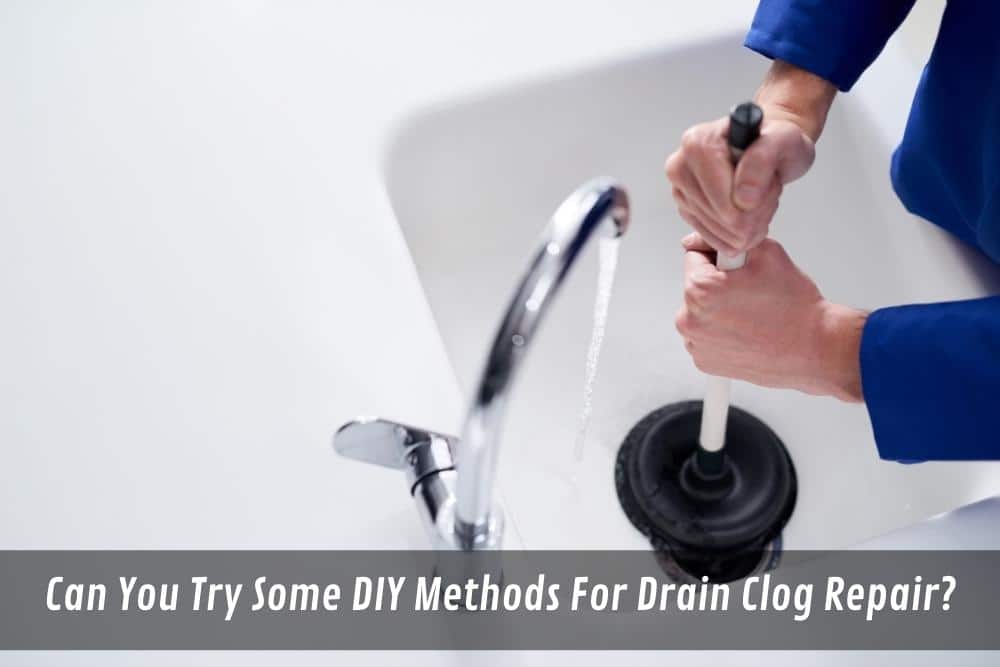
Drain repair is a common household problem that can be both frustrating and expensive to fix. Homeowners may attempt DIY methods to solve the issue, but professional plumbing services are also available.
When it comes to drain clog repair, there are several DIY methods that are effective and can save you a good amount of money. Of course, it’s important to have a clear understanding of which methods can be helpful and which ones could potentially make the problem worse. Here’s a guide to some DIY methods that may help you unclog your drain.
This blog post will explore the effectiveness of DIY methods for drain clog repair and when it’s best to call in a professional for more serious clog repair issues. If you’re dealing with a clogged drain, read on to learn about your options.
What are the causes of drain clogs?
- The most common cause of a drain clog is an accumulation of debris. Such as hair, soap scum, food particles, and other items that can get stuck in the pipes.
- Other causes include tree roots growing into the plumbing system, broken drains or pipes, or blockages caused by stormwater drain systems.
Whatever the cause may be, it’s important to identify it before attempting any DIY methods of repair.
What are the DIY methods for unclogging drains?
- Cup of Baking Soda: Prepare 1/2 cup of baking soda. Pour it down the drain and let it sit for 10-15 minutes before you add a cup of vinegar. This combination can help with slow-draining drains, grease clogs, and other types of blockages. After the mixture sits for a while, pour boiling water down the drain to flush out any debris or residue that may have been loosened by the baking soda and vinegar.
- Drain Opening: Use an old coat hanger or long wooden spoon to open up the drain opening in order to try and remove any visible debris that may be causing the clog. Be careful not to push too hard as this can cause damage to your pipes.
- High-Pressure Water: If your shower drain is still clogged after the baking soda and vinegar remedy, you may need to use a higher pressure of water. You can try using a garden hose or pressure washer, but make sure to use the lowest setting possible. Be especially careful when using this method as it can cause damage to your pipes if done incorrectly.
- Chemical Drain Cleaner: Store-bought chemical drain cleaners can be effective for clearing out tough clogs, but be sure to read the instructions before using them. These products often contain very strong chemicals that should not be used on certain types of pipes.
- Pipe Relining: If the clog is deep in the pipes, you may need to try pipe relining. This process involves using an insertable liner that is inserted into the pipes and inflated with a curing agent. The liner hardens and provides a new inner surface for the pipe. It can help to prevent future clogs from occurring. This method works best when done by a professional plumber as it requires special tools and knowledge of plumbing systems.
What are the potential risks associated with attempting a DIY Clog repair?
Attempting a DIY drain clog repair on a blocked drain can be risky. The potential risks vary depending on the type of clog and how deep it is in the pipes.
- One potential risk is damaging your plumbing system if you are not careful when using certain tools or techniques. For example, if you are using a garden hose to try and clear a clog, make sure that you don’t use too much pressure. This could cause damage to your pipes.
- Additionally, store-bought chemical drain cleaners often contain very caustic chemicals. They should not be used in large quantities or on certain types of pipes. If the clog persists after using these products, it’s best to call in a professional plumber.
When to call a professional plumber for drain clog repair?
It’s important to know when it is time to call a professional plumber for drain clog repair. While it can be tempting to try some quick DIY methods to unclog your drains, not all clogs are the same and some may require more specialized tools or knowledge.
If you’ve tried all of the DIY methods for drain cleaning and clog repair and still find yourself stuck, it’s time to call the best plumber in Sydney. They will have the right tools and knowledge to identify what is causing your clogged drain, locate it, and then unclog it safely. For example, they may use a drain snake or hydro jetting equipment to eliminate hair, soap and tough blockages. If tree roots are causing your clog, they may recommend pipe relining. This is to prevent future blockages from occurring.
Additionally, if you are dealing with stormwater drainage, tree roots, broken drains or other more complex scenarios then it’s best to leave it in the hands of a professional plumber who has experience dealing with these types of scenarios.
Overall, DIY methods for drain clog repair can be a great way to save money on plumbing costs. However, it’s important to know when it’s time to call in a professional plumber. They will have the right tools and knowledge to properly unclog your drains. As well as prevent any future blockages from occurring. Additionally, knowing the steps to prevent plumbing issues before they happen can also help save you time, money and hassle in the long run.
Contact Emergency Plumbers today to help with your drain clog repair needs. Our team of experienced plumbers are available 24/7 to help with any plumbing issue you may be facing.







Comments are closed